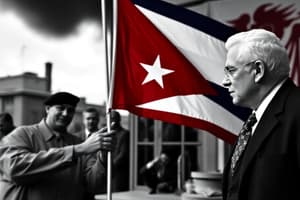Podcast
Questions and Answers
What was the main reason for the US intervention in the Korean War?
What was the main reason for the US intervention in the Korean War?
- To prevent the expansion of communism into South Korea. (correct)
- To protect US interests in the region.
- To support the democratic government of South Korea.
- To establish a military presence in the region.
In what way did the Vietnam War differ from the Korean War?
In what way did the Vietnam War differ from the Korean War?
- The Vietnam War was a conflict between two superpowers, while the Korean War was a civil war.
- The Vietnam War was a direct result of Cold War tensions, while the Korean War was not.
- The Vietnam War ended with a ceasefire agreement, while the Korean War resulted in a divided country.
- The US intervention in the Vietnam War was more protracted and involved than in the Korean War. (correct)
What was the significance of the Cuban Missile Crisis?
What was the significance of the Cuban Missile Crisis?
- It led to the collapse of the Soviet Union.
- It marked the end of the Cold War.
- It demonstrated the superiority of Soviet military technology.
- It was the closest the world came to a nuclear war. (correct)
Which event occurred first in the chronological order of the Cold War confrontations?
Which event occurred first in the chronological order of the Cold War confrontations?
Which statement best describes the impact of the Cold War confrontations?
Which statement best describes the impact of the Cold War confrontations?
Which of the following was NOT a regional conflict during the Cold War where the two superpowers were directly or indirectly involved?
Which of the following was NOT a regional conflict during the Cold War where the two superpowers were directly or indirectly involved?
What was the primary reason the Cold War did not escalate into a full-scale World War?
What was the primary reason the Cold War did not escalate into a full-scale World War?
What is the term used for the arms race between the US and USSR during the Cold War?
What is the term used for the arms race between the US and USSR during the Cold War?
What was the goal of the 'Star Wars' doctrine?
What was the goal of the 'Star Wars' doctrine?
Which of the following events ushered in the Space Era?
Which of the following events ushered in the Space Era?
What was the primary motivation for the two superpowers to engage in military competition during the Cold War?
What was the primary motivation for the two superpowers to engage in military competition during the Cold War?
Which of the following BEST describes the nature of the Cold War?
Which of the following BEST describes the nature of the Cold War?
Which of the following was NOT a key element of the confrontation between the US and USSR during the Cold War?
Which of the following was NOT a key element of the confrontation between the US and USSR during the Cold War?
What was Stalin's primary objective in establishing the Council of Mutual Assistance (SAOV - KOMKON) in 1949?
What was Stalin's primary objective in establishing the Council of Mutual Assistance (SAOV - KOMKON) in 1949?
Which of these events is NOT considered a significant crisis that exacerbated the confrontation between the Cold War coalitions?
Which of these events is NOT considered a significant crisis that exacerbated the confrontation between the Cold War coalitions?
What was the primary objective of the US in intervening in the Greek Civil War?
What was the primary objective of the US in intervening in the Greek Civil War?
Which of these developments ultimately led to the belief of absolute security being shaken?
Which of these developments ultimately led to the belief of absolute security being shaken?
How did the Berlin Crisis exemplify the growing confrontation between the two Cold War coalitions?
How did the Berlin Crisis exemplify the growing confrontation between the two Cold War coalitions?
What was the primary goal of the Soviet Union in supporting the communist rebels during the Greek Civil War?
What was the primary goal of the Soviet Union in supporting the communist rebels during the Greek Civil War?
What was the significance of the Korean Crisis in the broader context of the Cold War?
What was the significance of the Korean Crisis in the broader context of the Cold War?
How did the development of nuclear weapons impact the concept of security during the Cold War?
How did the development of nuclear weapons impact the concept of security during the Cold War?
Flashcards
Cold War
Cold War
A 40-year conflict between military coalitions led by the USA and USSR, defined by ideological and military competition.
Regional Conflicts
Regional Conflicts
Conflicts like the Korean War or Vietnam War where superpowers were indirectly involved during the Cold War without causing a world war.
Star Wars
Star Wars
A costly military strategy aimed at developing missile defense systems, part of the arms race during the Cold War.
Nuclear Weapons
Nuclear Weapons
Signup and view all the flashcards
Arms Race
Arms Race
Signup and view all the flashcards
Technological Competition
Technological Competition
Signup and view all the flashcards
Sputnik
Sputnik
Signup and view all the flashcards
Yuri Gagarin
Yuri Gagarin
Signup and view all the flashcards
Korean War
Korean War
Signup and view all the flashcards
Vietnam War
Vietnam War
Signup and view all the flashcards
Cuban Missile Crisis
Cuban Missile Crisis
Signup and view all the flashcards
Containment Policy
Containment Policy
Signup and view all the flashcards
Space Competitiveness
Space Competitiveness
Signup and view all the flashcards
Communist Parties' Intelligence Office
Communist Parties' Intelligence Office
Signup and view all the flashcards
Council of Mutual Assistance (KOMKON)
Council of Mutual Assistance (KOMKON)
Signup and view all the flashcards
Greek Civil War
Greek Civil War
Signup and view all the flashcards
Berlin Crisis
Berlin Crisis
Signup and view all the flashcards
Berlin Airlift
Berlin Airlift
Signup and view all the flashcards
Korean Crisis
Korean Crisis
Signup and view all the flashcards
Study Notes
Cold War Events
- The Cold War was a 40-year rivalry between two military alliances, marked by escalating tensions and regional conflicts. These conflicts never escalated to a full-scale World War III.
- Key conflicts involved the Greek crisis, Korean crisis, Berlin crisis, Cuban Missile Crisis, and the Vietnam War.
- Competition between the superpowers (US and USSR) drove an arms race.
- A critical feature was the development and deployment of nuclear weapons. Both sides possessed massive arsenals, but the potential for total human destruction prevented their use.
- The race for space exploration (e.g. Sputnik, Yuri Gagarin, Neil Armstrong, Moon landing) demonstrated technological competition and national prestige.
- Military competition involved huge spending and the development of new conventional weapons (e.g., missiles).
- Ideological, political and economic confrontations also occurred alongside military competition.
- In 1947, Stalin established a communist parties intelligence office to control parties.
- The USSR countered the Marshall Plan with the Council for Mutual Economic Assistance (COMECON) in 1949.
- The Greek Civil War (1946-1949) started due to a divided government. The US supported the right, while the USSR supported communist forces.
- The Berlin Crisis (1948-1949) involved the Soviet blockade of West Berlin. Allied airlifts delivered supplies, and the crisis heightened tension.
- The Korean War (1950-1953) started when North Korea (communist) attacked South Korea (democratic). The US intervened to stop communist expansion.
- The Vietnam War (1955-1975) saw a communist North Vietnam against a South Vietnam backed by the US, leading to significant US involvement.
- The Cuban Missile Crisis (1962) involved the Soviets positioning nuclear missiles in Cuba, creating an immediate threat to US security. Resolution came through American persistence.
- The conflict was marked by both direct (e.g., proxy wars) and indirect confrontation methods.
Studying That Suits You
Use AI to generate personalized quizzes and flashcards to suit your learning preferences.




